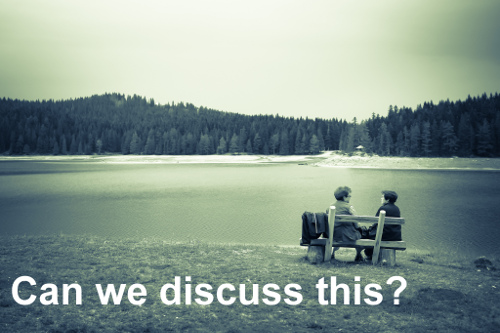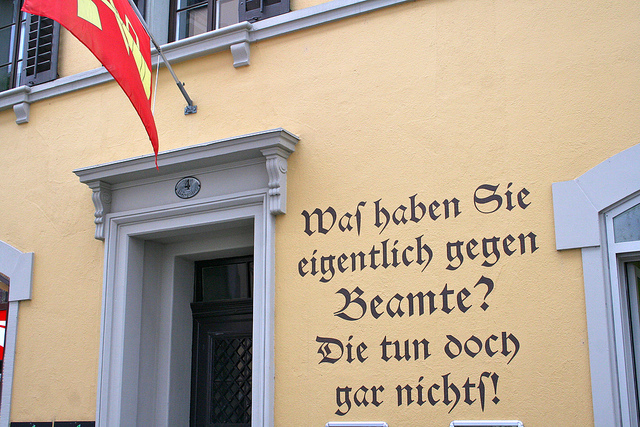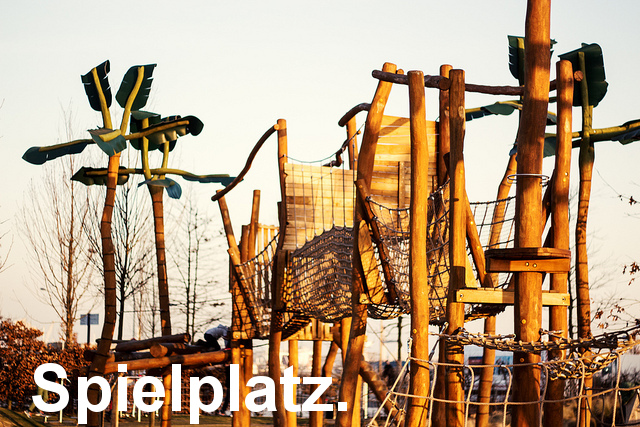Germans don’t like to talk. But they love to discuss. Just turn on German TV on a Friday night. Everyone is discussing. Actually, they’re diskutieren.
And no one likes to discuss more than bureaucrats (German: Beamte).
If you run into a Beamte in their natural environment – an office – a refusal is often not actually a refusal. It’s an invitation to discuss.

“Das können wir leider nicht für Sie heute erledigen,” a Beamte might say: I’m sorry, we can’t do that for you today. That might be the literal translation but my wife has taught me some Beamtish and what they’re really saying is: “Give me a good reason to do that for you, if possible supported by several official-looking documents and a legal precedent or two.”
Even crazier than that statement: People actually do this and it works.
My wife is a professional diskutierer. She should be, she’s German. But even Germans should pay her to square off with Beamten. She doesn’t go into a government office to get something done. She goes in to create art. In a municipal building, my wife is a Jedi Knight among a sea of Imperial soldiers: “These are the documents you’re looking for.” (yes, I avoided the words “Storm Troopers” because, history).
Jedi at the Bürgeramt Rathaus Mitte
Shortly after the birth of our second child we moved and had to register our new address, as everyone in Germany does. This was in the days when everyone used the Internet except the German government: You couldn’t get an appointment and you couldn’t do it online or even through the mail. We had to go to Bürgeramt Rathaus Mitte and we were immediately confronted with a waiting room full of annoyed Bürger (anyone not a Beamte).
“We need to register our new address,” my wife said, rocking a baby in a Maxi-Cosi on her chest. “How do we do that?”
The woman behind the counter seemed to delight at the question. I thought because she was going to turn us down but now I know it was because it was a chance to discuss.

“Normally I’d give you a number and you would go upstairs and wait your turn but there’s no point. They won’t get to you today. There are too many people here.” My words sound much nicer than hers. She made it sound like we had just asked a pilot if we could fly the plane ourselves.
“I realize that, but my husband took the afternoon off and we’ve got the baby asleep so maybe we can just get a number and see what happens,” my wife said, as cool as, well, a Beamte.
“There’s no point, they won’t get to you. I’m not giving you a number,” the Beamtin replied. I’m pretty sure she hissed this. It may have even been in a reptilian language everyone knows somewhere deep in the primitive portions of their brains.
Beamten may be a different species entirely.
It incensed me. I was preparing a lambasting about taxpayers and public servants that could possibly have won me an Oscar, or maybe a Nobel Prize. But my wife raised her hand as if to say: ‘I’ve got this.’
“OK, but my husband took the afternoon off and we’ve got the baby asleep so maybe we can just get a number and see what happens. It’s our problem.” My wife, I laughed to myself, how optimistic! And dumb. I started fuming inside. It was clear this Beamtin wasn’t going to help us.
“Well,” the Beamtin said, “Do you have all the paperwork? Let me see it.”
“Oh!” I thought. “Clever trick!” I assumed she would tell us we didn’t have all our ducks in a row and send us away with a condescending smirk.
“Nice try, Frau Beamtin,” I thought to myself. “We know what we’re doing! We’ve got everything! Check mate!”
I was really proud of us.
The Beamtin took the paperwork, turned around, typed something in a computer, placed a stamp on another piece of paper and handed everything back to us.
“There,” she said, “I did it for you. Have a nice day.”
Let’s just pause for a moment. Because the moment was that good. It was one of the best in my life. Maybe even ahead of the birth of my children or the first time I saw Star Wars. I felt like we won life that day. We defeated all of Berlin.
“I can’t believe you did that!” I said as we left victoriously, new registration in hand.
“Did what?” my wife said. “Sometimes you just have to have a discussion with people.”
9 Comments

